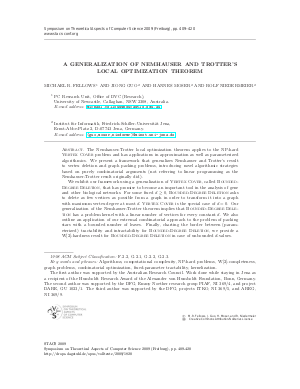A Generalization of Nemhauser and Trotter's Local Optimization Theorem
Authors Michael R. Fellows, Jiong Guo, Hannes Moser, Rolf Niedermeier
-
Part of:
Volume:
26th International Symposium on Theoretical Aspects of Computer Science (STACS 2009)
Part of: Series: Leibniz International Proceedings in Informatics (LIPIcs)
Part of: Conference: Symposium on Theoretical Aspects of Computer Science (STACS) - License:
 Creative Commons Attribution-NoDerivs 3.0 Unported license
Creative Commons Attribution-NoDerivs 3.0 Unported license
- Publication Date: 2009-02-19
File

PDF
LIPIcs.STACS.2009.1820.pdf
- Filesize: 221 kB
- 12 pages
Document Identifiers
Subject Classification
Keywords
- Algorithms
- Computational complexity
- NP-hard problems
- W[2]-completeness
- Graph problems
- Combinatorial optimization
- Fixed-parameter tractability
- K
Metrics
- Access Statistics
-
Total Accesses (updated on a weekly basis)
0Document
0Metadata
Abstract
The Nemhauser-Trotter local optimization theorem applies to the NP-hard \textsc{Vertex Cover} problem and has applications in approximation as well as parameterized algorithmics. We present a framework that generalizes Nemhauser and Trotter's result to vertex deletion and graph packing problems, introducing novel algorithmic strategies based on purely combinatorial arguments (not referring to linear programming as the Nemhauser-Trotter result originally did).
We exhibit our framework using a generalization of \textsc{Vertex Cover}, called \textrm{\sc Bounded-Degree Deletion}, that has promise to become an important tool in the analysis of gene and other biological networks. For some fixed~$d\geq 0$, \textrm{\sc Bounded-Degree Deletion} asks to delete as few vertices as possible from a graph in order to transform it into a graph with maximum vertex degree at most~$d$. \textsc{Vertex Cover} is the special case of $d=0$. Our generalization of the Nemhauser-Trotter theorem implies that \textrm{\sc Bounded-Degree Deletion} has a problem kernel with a linear number of vertices for every constant~$d$. We also outline an application of our extremal combinatorial approach to the problem of packing stars with a bounded number of leaves. Finally, charting the border between (parameterized) tractability and intractability for \textrm{\sc Bounded-Degree Deletion}, we provide a W[2]-hardness result for \textrm{\sc Bounded-Degree Deletion} in case of unbounded $d$-values.
Cite As Get BibTex
Michael R. Fellows, Jiong Guo, Hannes Moser, and Rolf Niedermeier. A Generalization of Nemhauser and Trotter's Local Optimization Theorem. In 26th International Symposium on Theoretical Aspects of Computer Science. Leibniz International Proceedings in Informatics (LIPIcs), Volume 3, pp. 409-420, Schloss Dagstuhl – Leibniz-Zentrum für Informatik (2009)
https://doi.org/10.4230/LIPIcs.STACS.2009.1820
BibTex
@InProceedings{fellows_et_al:LIPIcs.STACS.2009.1820,
author = {Fellows, Michael R. and Guo, Jiong and Moser, Hannes and Niedermeier, Rolf},
title = {{A Generalization of Nemhauser and Trotter's Local Optimization Theorem}},
booktitle = {26th International Symposium on Theoretical Aspects of Computer Science},
pages = {409--420},
series = {Leibniz International Proceedings in Informatics (LIPIcs)},
ISBN = {978-3-939897-09-5},
ISSN = {1868-8969},
year = {2009},
volume = {3},
editor = {Albers, Susanne and Marion, Jean-Yves},
publisher = {Schloss Dagstuhl -- Leibniz-Zentrum f{\"u}r Informatik},
address = {Dagstuhl, Germany},
URL = {https://drops.dagstuhl.de/entities/document/10.4230/LIPIcs.STACS.2009.1820},
URN = {urn:nbn:de:0030-drops-18200},
doi = {10.4230/LIPIcs.STACS.2009.1820},
annote = {Keywords: Algorithms, Computational complexity, NP-hard problems, W\lbrack2\rbrack-completeness, Graph problems, Combinatorial optimization, Fixed-parameter tractability, K}
}
